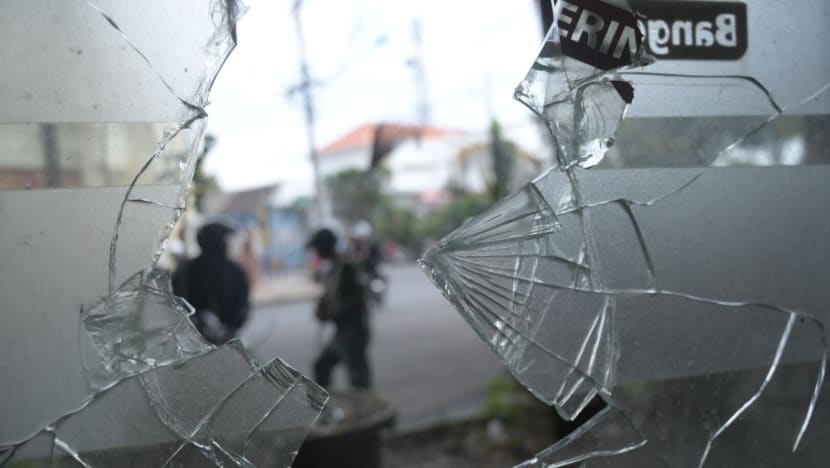World
Protests Erupt Across Indonesia After Police Violence, Threatening Prabowo

Violent protests broke out across Indonesia, particularly in Jakarta, on August 29, 2023, driven by public outrage over police violence and lawmakers’ insensitivity to the struggles of ordinary citizens. The unrest was ignited by the tragic death of a motorcycle taxi driver, Affan Kurniawan, who was killed by a police armored vehicle during a protest against lawmakers’ proposed allowance hikes. The situation escalated as demonstrators targeted police stations and the national parliament building, expressing deep-seated frustration with their government.
The protests began following a police crackdown during a demonstration against the increase in lawmakers’ housing allowances, which were raised to 50 million rupiah (US$3,075). Many citizens view this hike as particularly egregious given the current economic climate, characterized by government austerity measures, limited job opportunities, and the looming threat of mass layoffs. Political analysts warn that the unrest could have serious implications for President Prabowo Subianto if the administration fails to respond effectively.
Outrage Over Police Violence and Legislative Insensitivity
As Jakarta residents surveyed the aftermath of the protests on Saturday morning, signs of destruction were evident. Burned-out vehicles and debris littered the streets surrounding the Mobile Brigade headquarters in Central Jakarta. Bus shelters and police posts had been set ablaze, while anti-police graffiti marked the walls of the Jakarta Police headquarters and the national parliament.
In other cities such as Makassar, protests turned deadly, with three individuals killed when demonstrators set fire to the provincial parliament building. Additional unrest occurred in cities including Surabaya, Bandung, Solo, and Yogyakarta, reflecting a nationwide fury over police brutality and governmental negligence. The death of Affan Kurniawan, who was not participating in the protests at the time of his fatal encounter with the police, has shifted public demands from mere opposition to legislative pay increases to a broader call for accountability and justice.
Political analysts emphasize that the protests are a culmination of pent-up frustration directed not only at lawmakers but also at the police force. According to Ambang Priyonggo from Universitas Multimedia Nusantara, the protests were “predictable” given the ongoing dissatisfaction with political elites whose policies fail to address the needs of the populace.
Political Ramifications and Calls for Reform
The atmosphere remains volatile, with the potential for further clashes looming. Analysts assert that the increase in lawmakers’ allowances comes at a time when many Indonesians are struggling to make ends meet, exacerbating the public’s anger. Some legislators responded dismissively to the protests, with National Democratic Party member Ahmad Sahroni labeling those advocating for the dissolution of parliament as “the dumbest people in the world.” Such remarks have only intensified public outrage.
The composition of the Indonesian parliament, where approximately 81 percent of the 580 seats are held by parties in Prabowo’s ruling coalition, has led to accusations of complacency among lawmakers. Agung Baskoro, a political analyst at the Trias Politika institute, noted that citizens feel unrepresented as parliament has failed to exercise proper oversight of the government.
In response to the unrest, House Speaker Puan Maharani issued an apology on behalf of the parliament, admitting that they “have not fully carried out our duties as representatives of the people.” Nonetheless, analysts like Kunto Adi Wibowo argue that this apology came too late to quell public anger.
The situation poses a significant challenge to President Prabowo, who has called for an investigation into the police violence. While he has pledged support for Affan’s family, analysts insist that mere words are not enough. Comprehensive police reform is essential, with calls for the dismissal of National Police Chief Listyo Sigit Prabowo, who has been criticized for failing to address the police force’s repressive tendencies.
As protests continue, the Civil Society Coalition—a group representing numerous civic organizations—has urged for drastic changes to how the police operate. Ray Rangkuti, a political analyst at the Lingkar Madani think tank, emphasized that Prabowo must also address broader bureaucratic reforms to demonstrate genuine commitment to the public’s welfare.
The unrest in Indonesia underscores a critical moment for President Prabowo’s administration. Should these protests remain unaddressed, they could lead to a more significant political crisis, reflecting the discontent of a populace seeking accountability and meaningful change.
-

 World5 months ago
World5 months agoSBI Announces QIP Floor Price at ₹811.05 Per Share
-

 Lifestyle5 months ago
Lifestyle5 months agoCept Unveils ₹3.1 Crore Urban Mobility Plan for Sustainable Growth
-

 Science4 months ago
Science4 months agoNew Blood Group Discovered in South Indian Woman at Rotary Centre
-

 World5 months ago
World5 months agoTorrential Rains Cause Flash Flooding in New York and New Jersey
-

 Top Stories5 months ago
Top Stories5 months agoKonkani Cultural Organisation to Host Pearl Jubilee in Abu Dhabi
-

 Sports4 months ago
Sports4 months agoBroad Advocates for Bowling Change Ahead of Final Test Against India
-

 Science5 months ago
Science5 months agoNothing Headphone 1 Review: A Bold Contender in Audio Design
-

 Top Stories5 months ago
Top Stories5 months agoAir India Crash Investigation Highlights Boeing Fuel Switch Concerns
-

 Business5 months ago
Business5 months agoIndian Stock Market Rebounds: Sensex and Nifty Rise After Four-Day Decline
-

 Sports4 months ago
Sports4 months agoCristian Totti Retires at 19: Pressure of Fame Takes Toll
-

 Politics5 months ago
Politics5 months agoAbandoned Doberman Finds New Home After Journey to Prague
-

 Top Stories5 months ago
Top Stories5 months agoPatna Bank Manager Abhishek Varun Found Dead in Well









